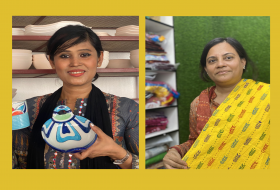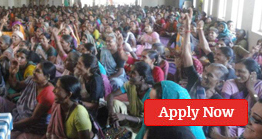You are here
Supporting women entrepreneurs in South Asia through training in networking, e-commerce and digital marketing
Supporting women entrepreneurs in South Asia through training in networking, e-commerce and digital marketing
Supporting women entrepreneurs in South Asia through training in networking, e-commerce and digital marketing
SAARC Development Fund, September 2022 - There has been an unprecedented growth in e-commerce and online business. Evidence is emerging on how the COVID-19 pandemic has accelerated this trend of using digital marketplace and e-commerce, particularly by women entrepreneurs to transform their businesses.
Research shows that in 2021, retail e-commerce sales amounted to approximately USD 4.9 trillion worldwide (Ascendia). The boom has been particularly salient in South Asia, where the e-commerce sector has grown exponentially.
Rehana Akter, 44, is an entrepreneur who set up Bangladesh’s first manually produced clay ceramics business – Clay Image. Her tableware ceramics are handcrafted using underglaze paint designs to make them non-toxic and eco-friendly. In 2002, Rehana built a kiln -a thermally insulated chamber – in the backyard of her house to glaze the handmade pottery.
From only one store in Dhanmondi, Dhaka, Clay Image’s physical presence has expanded to 10 stores in Bangladesh along with the growing presence online. Today, her products are sold in over 35 countries, especially through her digital and e-commerce platforms.
Rehana is one of the many participants of the SDF-funded training under the project “Networking and Capacity Building of Women Entrepreneurs (SMEs) from SAARC Countries”, which has helped female entrepreneurs and businesswomen learn how to harness the potential of digital marketing and e-commerce to strengthen their businesses.
With an approved budget of USD 0.73 million, the project began in 2017 in Afghanistan, Bangladesh, Bhutan, India, Nepal and Pakistan and successfully completed in 2020. The objective was to encourage and promote co-operation and partnership among business women and facilitate entrepreneurial activities at regional and sub-regional levels.
“It was the first time I was attending such a training and it was timely. The training was held right before the COVID-19 pandemic so whatever we had learned were put to practice during the crisis. We had to go digital,” says Rehana. “With lockdowns and restrictions, we made our goods and services accessible online. This has helped us explore other markets and connect with our customers.
According to the Rehana, the turnover from her handmade ceramic products has grown to about BDT 1 crore. Clay Image has about 70 employees, most of them girls from disadvantaged families, who are now skilled in the art of making quality handmade ceramics.
Another participant of the training, Luisha Akhter says that social media marketing has shown tangible changes in her business. The training inspired her to open up social media accounts for her business and to start taking orders online. Forty-seven-year-old Luisha is the owner of Anupama Hoshtohshilpo, a clothing and handicraft store using traditional knitting and patterns. A housewife seven years ago, Luisha now runs a production unit in Bogura, Bangladesh with 65 workers and four supervisors to meet the growing demand mainly through her online platforms.
SDF’s partners in implementing this project in Bangladesh, the Bangladesh Women Chamber of Commerce and Industry (BWCCI), say that there is a strong uptake of e-commerce across the region with consumers making a greater shift to online shopping. SDF’s funding has allowed them to kickstart this initiative among women entrepreneurs and BWCCI is now scaling up this project with support from other development partners to train more women entrepreneurs.















